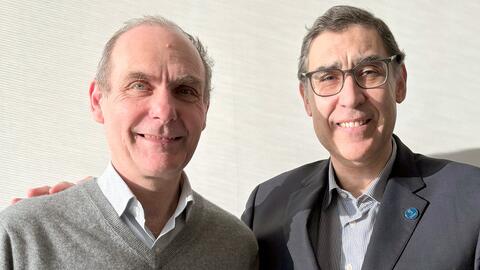
Creation of the Global Health Institute
The ambition of the Sorbonne University Alliance Global Health Institute (ASU-GHI) is to improve access to care, prevention and equity in health through a systemic and participatory approach integrating the study of biological, environmental and psychosocial determinants of health.
To achieve this, the Institute for Global Health brings together the complementary expertise of members of the three faculties of Sorbonne Université, the Muséum national d'histoire naturelle, INSEAD, Inserm, CNRS and the Université de technologie de Compiègne, in association with numerous European and international research institutions, the fruit of ASU's international partnership.

ASU-GHI's structural identity is based on a common foundation and purpose - access to care - and on the identification of ASU's areas of excellence in global health, validated by a bibliometric study, which identified the Institute's four priority areas:
- Health and environment, for example, studying the links between infectious and non-communicable diseases, the impact of climate on health and harmonizing environmental assessment methods.
- Autonomy, ageing, vulnerability, for example, by contributing to the autonomy of vulnerable people by studying life trajectories and the notion of bio-psycho-social age.
- Cancer, for example, improving the management of co-morbidities, reinforcing risk prevention and involving patients in the evaluation of treatments.
- Nutrition, e.g. understanding the impact of food environments in transition and promoting health-promoting consumption patterns, while taking into account cultural and socio-economic diversity.

The axes are considered through the prism of biomedical humanities, health economics, digital health and technologies. The Institute aims to promote innovative transdisciplinary research by facilitating collaboration between researchers at ASU and relevant partner institutions, to support the production of original knowledge with potential practical applications, to encourage the development of new training courses in research areas of interest, and to communicate on the health needs of populations in order to support decision-making and the development of global public health policies. In the short term, the Institute will prioritize the feasibility and attractiveness of its research, in order to deploy and deliver at mid-term a scientific project structured around a global approach to a theme envisaged in its interconnection with other identified themes. For example, the vulnerability of young adults needs to be considered in relation to nutrition in urban environments, while exploring the link between mental health and the autonomy of vulnerable populations requires a study of the conditions of access to culture and technology. The institute's strategy is to propose growth in stages, avoiding dilution across several subjects, in order to sustain the visibility and credibility of its model. The creation of the Institute of Global Health reflects the strong commitment of the ASU communities to health research, training and communication, essential levers for transforming our knowledge, practices and behaviours. This unprecedented structure will make it possible to propose concrete projects with a strong scientific and social impact, while promoting innovative initiatives that would not otherwise have seen the light of day.

L’ASU-GHI s'inscrit parmi les instituts et initiatives pluridisciplinaires de Sorbonne Université.
Dr Juan-Fernando Ramirez is the Institute's Director General (right) and Pr Jean-Michel Oppert, its Scientific Director (left).
Pr Renaud Piarroux chairs the Strategic Orientation Committee, while Pr Catherine Tourette-Turgis also plays an active role. They are joined on the management committee by Professors Fabrice Carrat, Claire Rossi and Timothy Van Zendt, doctors Cécilia Bognon, Francoise Guillot and Anne-Lise Paradis, and professors Kiyoka Kinuwaga, Ferdinand Dhombres, Éléonore Bayan, Isabelle Cremer, Khadija Zegouagh, Jean-Baptiste Fini, Alexandre Escargueil and doctors Jean-Sébastien Cadwallader and Michel Dubois on the executive committee. Reflecting the participation of all ASU members in its multidisciplinary approach.
Since the beginning of February, the Institute has had the pleasure of welcoming Agnès Mahot as its General Secretary. With a Master's 2 in Global Health from UCL in London, she has begun to meet the teams and will make a valuable contribution to our community through her skills and know-how. She will also be actively supporting the Master 2 program run by the Faculty of Health Sciences, in collaboration with Marie Jaspar and Karine Lacombe. In addition, the Institute's team will soon be strengthened by the arrival of an educational design engineer, dedicated exclusively to developing the Institute's training activities.
Global health institute collaborations
Collaborations within the Faculty of Health Sciences extend over a vast network of partners and structures, including the Institut de soins primaires, the Institut Universitaire de Cancérologie (IUC), the UMS Autonomie, the rare disease networks, the Institut de myologie, the Department of Infectious Diseases, Physical Medicine and Rehabilitation (MPR), the Institut du cerveau, the Serment d’Augusta, the Université des Patients (UDP) and the l’IPLesp. These structures highlight the significant contributions made by healthcare players, while raising the profile of the projects and people involved. Active members of the Faculty of Health Sciences include E. Bayen (LIB, UMR 1146, CNRS UMR 7371), D. Cohen (ISIR, CNRS UMR7222), F. Dhombres (LIMICS, UMR 1142), K. Kinugawa (B2A, CNRS UMR 8256), J.- M. Oppert (CRNH-IdF), R. Vialle (Département Hospitalo-Universitaire MAMUTH), C. Tourette-Turgis (Université des Patients), F. Carrat (UMR 1136), B. Chaix (UMR 1136), M. Melchior (UMR 1136), M. Jaspar (UMR 1136), R. Métras (UMR 1136), K. Lacombe (UMR 1136), J.- S. Cadwallader (UMR 1136, InSPA), A.-G. Marcelin (UMR 1136), R. Piarroux (UMR 1136), E. Flamand-Roze (UM 75), T. Similowski (Département R3S, UMR 1158), G. Ibanez (Médecine Générale), F. Verdonk (Institut Pasteur), J. Gligorov (Service d'oncologie de l'hôpital Tenon), and O. Benveniste (UMR 974, ). These multidisciplinary collaborations are at the heart of development and innovation in healthcare.
Les collaborations au sein de la Faculté de Santé s'étendent sur un vaste réseau de partenaires et de structures, incluant l’Institut de soins primaires, l’Institut Universitaire de Cancérologie (IUC), l'UMS Autonomie, les réseaux maladies rares, L'Institut de myologie, le département des maladies infectieuses, la médecine physique et réadaptation (MPR), l’Institut du cerveau, le Serment d’Augusta, l'Université des Patients (UDP) et l’IPLesp. Ces structures valorisent les contributions significatives des acteurs de la Santé, tout en augmentant la visibilité des projets et des personnes qui y sont impliquées. Les membres actifs de la Faculté de Santé incluent E. Bayen (LIB, UMR 1146, CNRS UMR 7371), D. Cohen (ISIR, CNRS UMR7222), F. Dhombres (LIMICS, UMR 1142), K. Kinugawa (B2A, CNRS UMR 8256), J.-M. Oppert (CRNH-IdF), R. Vialle (département Hospitalo-Universitaire MAMUTH), C. Tourette-Turgis (Université des Patients), F. Carrat (UMR 1136), B. Chaix (UMR 1136), M. Melchior (UMR 1136), M. Jaspar (UMR 1136), R. Métras (UMR 1136), K. Lacombe (UMR 1136), J.-S. Cadwallader (UMR 1136, InSPA), A.-G. Marcelin (UMR 1136), R. Piarroux (UMR 1136), E. Flamand-Roze (UM 75), T. Similowski (Département R3S, UMR 1158), G. Ibanez (Médecine Générale), F. Verdonk (Institut Pasteur), J. Gligorov (Service d'oncologie de l'hôpital Tenon), et O. Benveniste (UMR 974, ). Ces collaborations multidisciplinaires sont au cœur du développement et de l'innovation en santé.

Un institut de santé globale ouvert à l'international
Internationally, the institute collaborates with partner institutions in the 4EU+ alliance, which includes leading universities such as Geneva, Heidelberg, Prague, Milan and Copenhagen. Sorbonne Université has established strong links with these partners to ensure complementarity and effective cooperation.
The Institute functions primarily as a catalyst, facilitating collaboration between its members and external partners. Its aim is to promote transdisciplinary research in global health, producing practical knowledge that contributes to public health policies and facilitating the creation of new academic training courses.
The institute stands out for its ability to coordinate and foster new collaborations, thereby strengthening research and training in global health.
The Alliance Sorbonne University Global Health Institute (ASU-GHI) is opening up internationally, with priority given to Asia and South America, and major collaborations mainly in North America and Europe. Although Africa was not explicitly highlighted in the initial priorities, it remains an area of interest, notably through past and future initiatives.
The institute's project is developing at several levels, notably through international collaborations already in place within the 4EU+ network and with potential partners. Asia is particularly important in the early stages of international development, as is South America, while strategic collaborations in North America are ongoing.
Current collaborative projects include nutrition, in partnership with UNAM in Mexico, and neuromuscular diseases, in collaboration with the Fiocruz Foundation in Brazil, as well as social epidemiology focusing on vulnerable populations, in cooperation with IIT Delhi. These initiatives strengthen international scientific exchanges and multidisciplinary research.
With regard to Africa, in-depth work has been initiated with a roadmap drawn up in January 2023 by colleagues such as Prof. Karine Lacombe and Prof. Renaud Piarroux, focusing on Sorbonne Université's international relations, which will need to be structured.
The Master's degree in Global Health, directed by Karine Lacombe, plays a central role in this opening up to the international arena, notably through an approach focused on the management of emerging medical events.
The Institute of Global Health is primarily focused on research and facilitating collaborations, without directly including care in its objectives. Many of the Institute's members are Sorbonne University hospital academics, but the Institute's primary focus is on defining, organizing and improving care pathways.
What counts most in the Institute are the people. It is they, with their commitment and passion, who drive the projects forward.
Have you made any concrete progress?
A call for doctoral projects was launched on January 20: see the call for projects.
In addition, the Université technologique de Compiègne (UTC), a member of the Alliance, offers a master's degree with a focus on economics. As part of this program, we will be developing a module dedicated to global health. Last year, they set up a pole of attraction around this master's degree, and for the first time we have included a module on global health to open up international perspectives. This initiative will be officially launched in September.
The Master's in Global Health, headed by Prof. Lacombe, will also open next September. This program, focusing on infectious diseases, is the first in France to be awarded the “Global Health” label, making it a major initiative for the institute. It is part of the Public Health specialization, with a dedicated Global Health track and a particular focus on infectious diseases, with a specific orientation towards Africa.
A key objective is to gradually integrate global health awareness into the curricula of Sorbonne University's health, science and human and social sciences faculties. The aim is to train professionals, doctors and decision-makers in a transdisciplinary, systemic and participatory approach.
The institute's cross-disciplinary and systemic approach aims to strengthen prevention, access to care and equity in health, by promoting collaboration between different disciplines and institutions.
